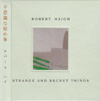 The fantastic final piece in Haigh's trilogy for Daisuke Suzuki's Siren label is now available, and, like the the second in the series, the title is a more than appropriate indication of what Haigh has accomplished with nearly the piano alone. Robert Haigh has already proven his mastery of the melody through his solo albums and multiple aliases but on display for this album is his ability to play, and and I don't mean to merely play the piano, but play with us, the audience. Strange and Secret Things is like 17 very short films, all of which seem to make surprising plot twists early on and finish in unpredictable places.
The fantastic final piece in Haigh's trilogy for Daisuke Suzuki's Siren label is now available, and, like the the second in the series, the title is a more than appropriate indication of what Haigh has accomplished with nearly the piano alone. Robert Haigh has already proven his mastery of the melody through his solo albums and multiple aliases but on display for this album is his ability to play, and and I don't mean to merely play the piano, but play with us, the audience. Strange and Secret Things is like 17 very short films, all of which seem to make surprising plot twists early on and finish in unpredictable places.
After recording for years in Truth Club, Fote, and under the guise of Sema, Robert Haigh removed the layers and removed the aliases and began to release music under his own name. The piano of Valentine Out Of Season (1986) on Steven Stapleton's United Dairies label made such a strong impact for being so simple, firmly establishing Haigh in England's hidden underground as -the- pianist to pay attention to. But only following his second solo album, A Waltz In Plain C (1989), Haigh abandoned the simplicity and followed his inspiration into the world of electronica as The Omni Trio, London Steppers, and Splice. But it is no surprise that each of first two albums continue to be in demand by collectors and new listeners: the music is delicate and simple but the piano pieces are so captivating that those who listen fall in love. Anyone who is "in the know" generally ranks them with high values in their collection.
His return to the use of his birth name corresponded with his return to the piano as the dominant instrument in 2007's From the Air, and Written On Water from 2008 was more focused on "patterns and counterpoint," according to Haigh in an interview with Luke Schleicher. It was this Siren series, however, that has sounded more like a true follow-up to Walz. Notes and Crossings, released 20 years after Waltz In Plain C, was a more pure, more focused selection of songs, however, with Robert removed from most of the decorations and dedicating himself more to the sound of the piano. This album is stripped down even further, with pretty much only the sound of the piano. The sound, the meter, the tone, the feel are all familiar to us fans of the '80s releases. It's those opening tones that continue to grab our attention, but for each piece, he takes the melodies in different directions.
Gone is the sort homage to minimalism, as Haigh creates variations all over the place.The album opens with "Sons of Light (prelude)," a bright, spring-like piece, introducing a melodic theme, repeating it, yet transposing multiple times back and forth between major and minor deviations. Other melodic flip flops spring up from time to time throughout the album's short pieces. These are, at least to me, the "secret things," as described in the title. The practice of switching-up the tune is much like revealing a new secret through each song.
"Revenant (Prelude)," is where Robert begins to introduce variations in tempo and force, making carefully controlled ritardandos on the main theme as it winds down, before repeating. These unexpected twists soon take the form of unpredictable melodic progressions, especially on the odd pieces like "Field Work," "Secret Codes (prelude)," and "Latitude 3," which each seem to surround the more languid, pleasant melodies, such as thegorgeous "Entre Deux (prelude)" and "Clear Water." To me, while the beautiful songs are the ones I think most people will latch on to, it's these odd pieces that leave listeners with more of a feeling of the "strange" part of the title.
Like last year's Anonymous Lights, this album ends with the longest song, and, with a title like "Requiem," Haigh is making it pretty clear that this is a distinct closing point, drawing this trilogy to an end. On "Requiem," Robert makes one last strange and secret surprise. Non-piano instrumentation makes an appearance with this song, for pretty much the first remarkable time on the album. The hushed wind and operatic vocal loop which are incorporated, however, are so subtle up against Robert's already quiet playing, they are bordering on inaudible. This may end what he described as his "piano trilogy," and with his mastery of such a fantastic interplay between the beautiful and strange, I'm quite happy, yet eager for more music this subtle, gorgeous, unpredictable, and tactfully unscarred by overt technology.
samples:
Read More

